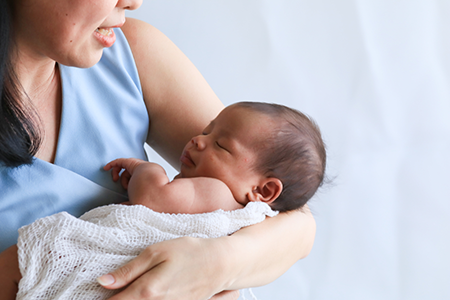 Your baby’s first immunizations and why they’re important
Your baby’s first immunizations and why they’re important
Immunizations are one of the many ways you can care for your baby’s health—today and for years to come. During the first year of your baby’s life, your baby's doctor will offer several vaccines to protect against many different illnesses.
Most newborns get their first vaccine within a day after birth. From there, you should work with your pediatrician to follow the guidelines from the CDC for immunizations at your infant’s routine checkups. Here are the conditions that you can protect your baby against through vaccinations during the first 12 months of life.
Hep B
Your baby’s first vaccine after birth will be against hepatitis B, a serious illness that affects the liver. The American College of Obstetricians and Gynecologists says this vaccine is recommended within 24 hours for all medically stable newborns who weigh more than 2,000 grams—about 4.4 pounds. Your baby will then have two more doses at around 1-2 months and 6-15 months.
Rotavirus
Rotavirus can cause severe gastrointestinal issues, such as vomiting and diarrhea, which can lead to dehydration. Your baby will either get 2 or 3 doses of this vaccine, depending on the type. These doses are given between 2-6 months of age. Instead of an injection, the rotavirus vaccine is given by mouth.
Diphtheria, tetanus, and pertussis
The DTaP vaccine protects your baby against multiple infections—diphtheria, tetanus, and pertussis, also called whooping cough. All of these can cause serious illness in your infant. DTaP vaccine requires multiple doses, including 2, 4, and 6 months, as well additional doses after your baby turns 1 year old.
Hib
According to Vaccines.gov, Haemophilus influenzae type b, or Hib, can cause an infection in babies and children in areas of the body like the brain or lungs. In some cases, these can be life-threatening. Your baby will get either 3 or 4 doses of this vaccine, typically around 2, 4, 6, and 12-15 months if needed.
Pneumococcal
The PVC13 vaccine protects against infection from pneumococcal, a type of bacteria. Pneumococcal can cause an infection in the blood, lungs, or brain. Your baby will usually receive this vaccine around the same time as the Hib vaccine—at 2, 4, 6, and 12-15 months.
Polio
The U.S. Library of Medicine says polio was a common cause of paralysis or death before a vaccine was developed in the 1950s. To protect your baby against polio, he or she will receive the IPV—inactive polio vaccine—during the first year of life at 2, 4, and 6-18 months. Sometimes this vaccine is also given in combination with the DTaP vaccine.
Measles, mumps, and rubella
The MMR vaccine helps protect your baby from three illnesses: measles, mumps, and rubella. Both measles and mumps can cause severe infections and complications such as brain swelling. The World Health Organization says rubella is most dangerous for pregnant moms and their unborn babies. Your baby will get his or her first MMR vaccine at 12-15 months.
Chickenpox
The varicella vaccine protects your infant against chickenpox. This virus can cause a rash and flu-like symptoms, but it can also lead to a more serious infection, such as pneumonia. The CDC says the varicella vaccine is also important because it can help lower the risk of shingles later in life. This vaccine is given at your baby’s 12- or 15-month checkup.
Hep A
Hepatitis A can cause complications in the liver, pancreas, and kidneys. The first dose of the Hep A vaccine is typically recommended for your child between 12-23 months. Another dose is needed later when your child is a toddler or preschooler.
Vaccines after the first year
In addition to these common vaccines during your baby’s first year, additional doses or other vaccines are recommended as your child grows. If you miss a vaccine during the first 12 months or have any concerns, talk with your pediatrician. He or she can help keep your baby on track, discuss any medical conditions that might prevent vaccines, and make sure you’re doing all you can to protect your child’s health.
